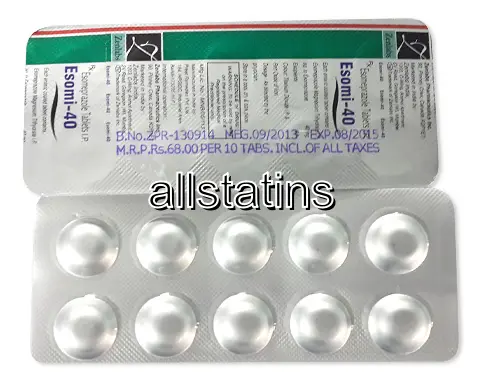| Package | Dosage | Price | Price per Dose | |
|---|---|---|---|---|
| Dosage: 20mg | ||||
| 360 pill | 20mg | $292.40 | $0.81 | |
| 270 pill | 20mg | $224.23 | $0.83 | |
| 180 pill | 20mg | $168.62 | $0.93 | |
| 120 pill | 20mg | $123.77 | $1.02 | |
| 90 pill | 20mg | $113.00 | $1.26 | |
| 60 pill | 20mg | $86.09 | $1.44 | |
| 30 pill | 20mg | $53.80 | $1.79 | |
| Dosage: 40mg | ||||
| 180 pill | 40mg | $216.36 | $1.20 | |
| 120 pill | 40mg | $152.47 | $1.27 | |
| 90 pill | 40mg | $138.12 | $1.54 | |
| 60 pill | 40mg | $100.45 | $1.67 | |
| 30 pill | 40mg | $62.77 | $2.10 | |

Esomeprazole Description
Overview of Esomeprazole
Esomeprazole is a widely used medication primarily prescribed for the treatment of conditions related to excessive stomach acid production. This drug belongs to the class of proton pump inhibitors (PPIs), which work by blocking the enzyme in the stomach wall responsible for acid secretion. As a result, Esomeprazole effectively reduces the amount of acid in the stomach, providing relief from symptoms and healing damage caused by acid-related conditions.
Uses and Benefits
One of the main uses of Esomeprazole is in the treatment of gastroesophageal reflux disease (GERD), where acid reflux causes heartburn and discomfort. It also treats erosive esophagitis, a condition characterized by inflammation and damage to the esophagus due to stomach acid. Additionally, Esomeprazole is used to prevent and treat stomach ulcers, especially those caused by long-term use of non-steroidal anti-inflammatory drugs (NSAIDs). In some cases, physicians prescribe it to manage Zollinger-Ellison syndrome, a rare disorder resulting in excessive gastric acid secretion. Patients often find this medication effective in alleviating symptoms and preventing further complications associated with excessive acid production.
How It Works
Esomeprazole works by selectively inhibiting the proton pump, which is a critical component involved in the final step of acid production in the stomach. When taken, it quickly reaches the stomach and binds to the proton pump, preventing the secretion of hydrochloric acid. This reduction in acid not only relieves symptoms like heartburn and indigestion but also allows damaged tissues in the esophagus and stomach to heal over time. The drug generally begins to work within a few hours of ingestion, with full effects observed after several days of consistent use.
Dosage and Administration
The appropriate dose of Esomeprazole varies depending on the condition being treated and the individual patient. It is commonly prescribed as a once-daily medication, with doses ranging from 20 mg to 40 mg. It is recommended to take Esomeprazole on an empty stomach, usually 30 to 60 minutes before a meal, to maximize absorption and efficacy. Patients should follow their healthcare provider's instructions carefully, avoiding sudden discontinuation unless advised. Consistency in taking the medication is key to achieving the desired therapeutic results.
Potential Side Effects
Like all medications, Esomeprazole can cause side effects, although not everyone experiences them. Common issues include headache, nausea, diarrhea, abdominal pain, and flatulence. These tend to be mild and often resolve on their own. However, some individuals may experience more serious effects such as allergic reactions, including rash, swelling, or difficulty breathing. Long-term use of Esomeprazole has been associated with a slightly increased risk of bone fractures, vitamin B12 deficiency, and gastrointestinal infections. Patients should report any unusual symptoms to their healthcare provider promptly.
Precautions and Interactions
It is important to inform your healthcare provider about all other medications you are taking, as Esomeprazole can interact with certain drugs. For example, it may affect the absorption and effectiveness of medications like clopidogrel, leading to reduced antiplatelet activity. Additionally, long-term use warrants caution, especially in individuals with osteoporosis or those who require ongoing acid suppression. Pregnant and breastfeeding women should consult their doctors before using Esomeprazole, as safety data is limited in these populations. Regular monitoring and medical guidance are recommended to minimize risks and ensure optimal treatment outcomes.
Final Thoughts
Overall, Esomeprazole is considered an effective and well-tolerated medication for the management of acid-related gastrointestinal conditions. Its ability to significantly reduce acid production helps alleviate symptoms, promote healing, and prevent complications. While generally safe when used as directed, it is crucial to follow medical advice and remain aware of potential side effects. Proper use of Esomeprazole can improve quality of life for many individuals suffering from acid reflux, ulcers, and other related disorders. Regular consultation with healthcare providers ensures safe and effective treatment tailored to each patient’s needs.
